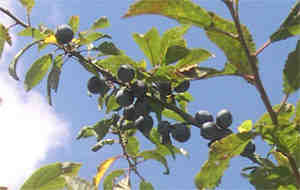The Great Sloe Gin Challenge – Three variations of our sloe gin recipe
Posted by Fiona Nevile in Liqueurs | 162 comments
Beautiful ripe sloes on the bush in September
“Pick after the first frosts,” advise the traditionalists.
“Pick them in September, before the bushes are stripped bare,” chortle the enthusiastic.
“Pick them now and give them a chilly blast in the freezer, to give the effect of the first frost,” suggest the practical.
There are other questions too. If the sloes are left to mature until the first frosts, do they have a better flavour? Does the quality of gin affect the liqueur? Should one strain gin from the sloes after three months, six months, ever?
I telephoned Gilbert to discuss this multiple conundrum. His advice was simple.
“Whatever you do, write it down on a label and stick it on the bottle. Then, if your brew is superb, you have the recipe. Note the tree, the time of picking, the gin and the amount of sugar and sloes. If you used almond essence, note how much on each label.”
I recalled that the most interesting part of his cellar was the vast liqueur wall. The label on each bottle and demijohn was covered in microscopic notes.
“Remember that the combination of gin, sloes and sugar is always better that the separate ingredients, no matter what you do.”
He is right. sloe gin sipped on a cold winter’s night is deliciously dangerous.
We have decided to run The Cottage Smallholder sloe gin test. We are going to make sloe gin now under laboratory conditions in the Cottage Smallholder kitchen. The sloe gin will by tasted and evaluated by a team of three experienced sloe gin drinkers.
Using the same gin (supermarket medium quality) and the same recipe, we are going to make sloe gin with three batches of sloes harvested from the same tree.
- The first bottle will contain freshly picked sloes, picked now in mid September.
- The second will have fresh sloes picked now but which will have had a night in the freezer.
- After the first frosts we are going to return to the same tree with a ladder to collect the frosted sloes that an average height forager can’t reach. The third bottle will contain these.
We will publish are results in a few months time.
Two years later we published the results of the sloe gin recipe challenge.
Sloe Gin Recipe:
Ingredients:
- 1lb/454gm of washed sloes
- 4 ozs/112gm of white granulated sugar
- 1 75cl bottle of medium quality gin
- Sterilised 1 litre (at least) Le Parfait jar or wide necked bottle
- 1 small quarter tsp almond essence
Method:
- Wash sloes well and discard any bruised or rotten fruit. Prick fruit several times with a fork and place sloes in either a large Kilner/Le Parfait jar or a wide necked 1 litre bottle. I put several sloes in my palm to prick them rather than picking them up one by one.
- Using a funnel, add the sugar and top up with gin to the rim. Always open sugar bags over the sink as sugar tends to get caught in the folds at the top of the bag.
- Add the almond essence.
- Shake every day until the sugar is dissolved and then store in a cool, dark place until you can resist it no longer (leave for at least three months, we usually let it mature for a year).
- Some people strain the grog (through muslin/jelly bag) after 3 months and bottle it, leaving it mature for six months. We usually strain and bottle after a year. We use some beautiful old heine brandy bottles with cork lids. If you are feeling flush Lakeland sell some pretty bottles here. Don’t leave the straining process any longer than a year; leaving the fruit in too long can spoil the liqueur.
For loads more tricks and tips on making sloe gin see the original sloe gin recipe
Leave a reply





Just found this and am making my first batch of sloe vodka. Using you recipe there is a lot more vodka in a 75 cal bottle than there are sloes. What would happen if I add more sloes until still covered by all the vodka? And would I need to as more sugar?
You say don’t leave your sloes on gin for more than a year, well I leave mine for 3 years and use honey instead of sugar. Its stunning!